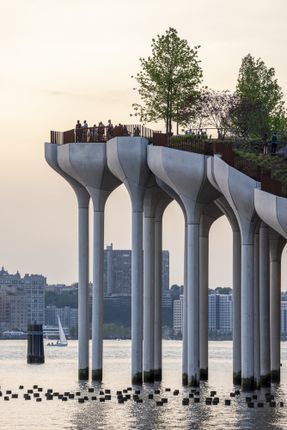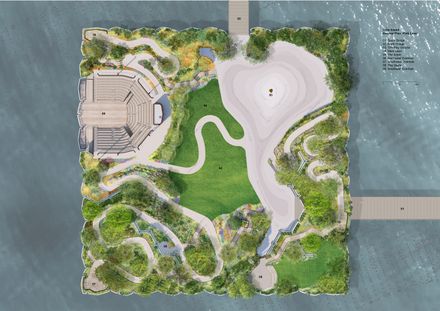
Little Island Park
STRUCTURAL ENGINEER
Arup
CATEGORY
Public Space, Park
YEAR
2021
DESIGN DIRECTOR
Thomas Heatherwick
MECHANICAL ENGINEERING
Arup
LANDSCAPE
MNLA
PROJECT LEADERS
Paul Westwood, Neil Hubbard
GROUP LEADER
Mat Cash
EXECUTIVE ARCHITECTS
Standard Architects
TECHNICAL DESIGN LEADER
Nick Ling
PHOTOGRAPHS
Timothy Schenck, Angela Weiss, Getty Images, China News Service, Getty Images, Alexi Rosenfeld, Getty Images
PROJECT TEAM
Sofia Amodio, Simona Auteri, Mark Burrows, Jorge Xavier Méndez- Cáceres, John Cruwys, Antoine van Erp, Alex Flood, Michal Gryko, Ben Holmes, Ben Jacobs, Francis McCloskey, Stepan Martinovsky, Simon Ng, Wojtek Nowak, Giovanni Parodi, Enrique Pujana, Akari Takebayashi, Ondrej Tichý, Ahira Sanjeet, Charles Wu, Meera Yadave
MAKING TEAM
Jordan Bailiff, Einar Blixhavn, Darragh Casey, Hayley Henry, Hannah Parker, Luke Plumbley, Jeff Powers
CLIENT
Hudson River Park Trust (HRPT) & Pier 55 Project Fund (P55P)
MARINE ENGINEERS
MRCE
COST CONSULTANTS
Gardiner & Theobald
MAIN CONTRACTOR
Hunter Roberts Construction Group
Little Island is a public park that shelters three new performance venues on the Hudson River.
Designed as a haven for people and wildlife, it is a green oasis, held above the water by sculptural planters, and located just a short walk across a gangplank from Manhattan’s Lower West Side.
Heatherwick Studio was initially invited by philanthropist Barry Diller and the Hudson River Park Trust to create a pavilion for a new pier off the southwest of Manhattan.
Instead of designing a decorative object to sit in the Hudson River Park, the design team saw an opportunity to rethink what a pier could be.
The starting point was not the structure, but the experience for visitors: the excitement of being over the water, the feeling of leaving the city behind and being immersed in greenery – inspired by Central Park, where it’s possible to forget that you are in the midst of the most densely populated city in the United States.
Piers were traditionally flat to allow boats to dock, but did they have to be? In contrast to the flat streets of Manhattan, the design team wanted to create a new topography for the city, which could rise up to shape a variety of spaces.
The first iteration was a curled leaf form floating on the water, its veins rising like ribs at the edges to shelter the space from the wind.
The idea of raising the park on its foundations came from the existing wooden piles in the water, remnants of the many piers that used to extend from the shoreline of Manhattan.
Beneath the visible tips of the wood, the piles have become an important habitat for marine life and are a protected breeding ground for fish.
Heatherwick Studio envisaged the pier as a complete experience; a single, cohesive object, rather than unrelated elements stuck together. New piles would be necessary to support any type of pier.
Instead of sticks holding up a deck, the piles become the deck – they extend into planters that join together to create the park’s surface.
The height of the piles varies to create the park’s contours: the corner of the pier is lifted to allow sunlight to reach the marine habitat, and the edge falls to define hills, viewpoints and to carve out a natural amphitheatre for performances. In this way, the pier and its supporting structure are one.
The planters or ‘pots’ are filled with more than a hundred different species of indigenous trees and plants, which encourage biodiversity and are able to thrive in New York’s climate – each corner of the island represents a different microclimate. To determine the pots’ form, the design team looked to nature and the mosaic of ice that forms around the wooden piles when the river freezes.
The studio reinterpreted this in a tessellated pattern that appears organic but uses repeated elements that could be standardised for fabrication. Care was taken to vary the angle and repetition of pots at the perimeter, where they were most visible. To give the structural concrete a smooth, tactile quality, Heatherwick Studio worked closely with a local fabricator. The precast components were transported by boats and assembled on site, minimising disruption to the city.









































